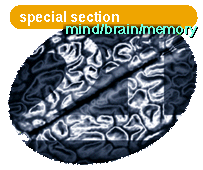

Mapping the intersections of being: the science of mind, brain, and memory
By HERBERT PARDES
MIND, BRAIN, MEMORY: somehow they define us as humans as nothing else does. They give us expression as sentient beings, letting us plan, predict, and remember our actions in ways that we believe no other animal can. They create consciousness of self and other entities within the physical universe--things that can become indistinguishable from that universe. They shape not only our perceptions of reality but, in a quantum world, may even be reality itself.They are capable of fixing abstract images that may exist nowhere except within themselves, a capability that may be the distinguishing characteristic of humans within the animal world. And the ability to communicate those abstractions from one mind to another through symbols, sounds, and physical contact may be the most marvelous and mysterious aspect of the human condition.
Since the beginning of rational thought, no subject has been more fascinating to those who ruminate on the meaning and expression of being human than how our mind defines us as natural beings. In seeking the seat of the soul, some philosophers have recognized that the mind's ability to conceive of such a thing as a soul may in fact be the prime condition for its existence. Scientists grapple with trying to understand how the physical properties of brain biology and metabolics relate to non-physical manifestations of thought and behavior. Questions that cross the boundaries of philosophy and science abound everywhere in mind/brain/memory research: Are we alive or dead if the brain is functioning organically but we are comatose? If we are depressed on a bright, beautiful day, is it because our body's chemistry is out of kilter, or are we warped in the soul? Is the heartsickness of unrequited love a result of an unsatisfied emotional longing or a temporary chemical imbalance in the endocrine system? Do we contemplate, and perhaps commit, suicide because some devil has possessed us or because a molecular malfunction has occurred in our genes?
We know that the brain is the seat of the mind, which is the bearer of memory--or do we? Which came first, the organic brain or the abstracted mind? Is the Cartesian proposition "I think, therefore I am" correct, or should it be "I am, therefore I think"? The answer may depend on whether an organic chemist, a Talmudic scholar, a behavioral scientist, or a fundamentalist Christian is speaking (not to mention a poet, a novelist, or a musician). No thinking, sentient being can escape the paradoxes of this elemental fact of our existence. And modern science at Columbia and elsewhere is pursuing these basic questions at every level of inquiry and within every discipline. In this special section of 21stC, we present a sampling of the fascinating perspectives that researchers and academics bring to the subject. The theme of these articles is the effort to understand how all components of our mind/brain/memory system interact to create something larger than its parts, an integrated existence, a sense of wholeness, a being that can be a subparticle of the universe while having the capacity to comprehend the entire cosmology itself.
I invite you to read these articles and reflect on the questions they address and in the process perhaps expand your own understanding of what it means to be human.
HERBERT PARDES, M.D., is Lawrence C. Kolb Professor of Psychiatry, vice president
for Health Sciences, dean of the Faculty of Medicine, and chairman of the Department of
Psychiatry at Columbia.




